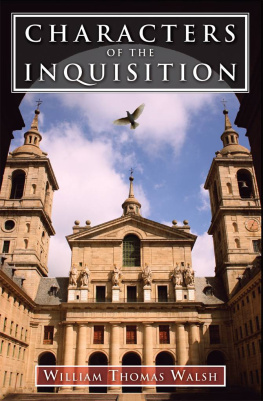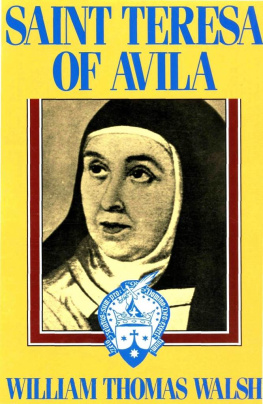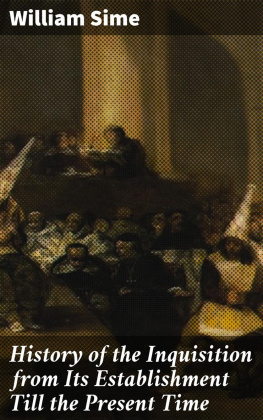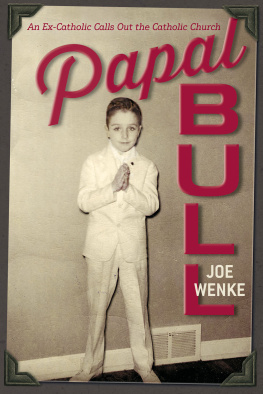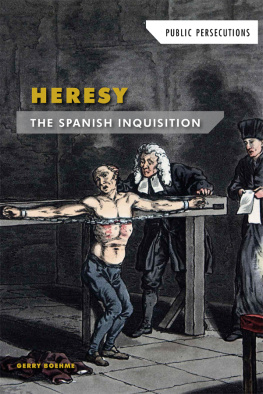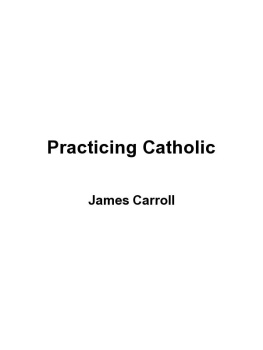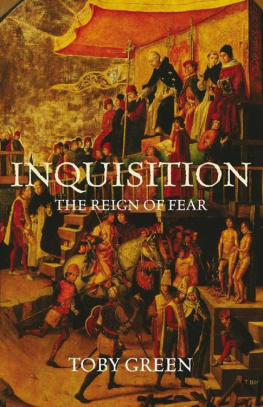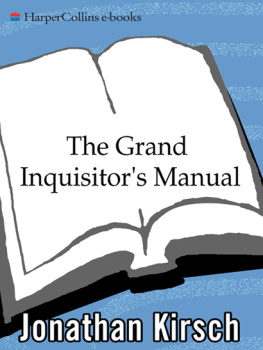William Thomas Walsh - Characters of the Inquisition
Here you can read online William Thomas Walsh - Characters of the Inquisition full text of the book (entire story) in english for free. Download pdf and epub, get meaning, cover and reviews about this ebook. year: 2005, publisher: TAN Books, genre: Religion. Description of the work, (preface) as well as reviews are available. Best literature library LitArk.com created for fans of good reading and offers a wide selection of genres:
Romance novel
Science fiction
Adventure
Detective
Science
History
Home and family
Prose
Art
Politics
Computer
Non-fiction
Religion
Business
Children
Humor
Choose a favorite category and find really read worthwhile books. Enjoy immersion in the world of imagination, feel the emotions of the characters or learn something new for yourself, make an fascinating discovery.
- Book:Characters of the Inquisition
- Author:
- Publisher:TAN Books
- Genre:
- Year:2005
- Rating:4 / 5
- Favourites:Add to favourites
- Your mark:
- 80
- 1
- 2
- 3
- 4
- 5
Characters of the Inquisition: summary, description and annotation
We offer to read an annotation, description, summary or preface (depends on what the author of the book "Characters of the Inquisition" wrote himself). If you haven't found the necessary information about the book — write in the comments, we will try to find it.
Characters of the Inquisition — read online for free the complete book (whole text) full work
Below is the text of the book, divided by pages. System saving the place of the last page read, allows you to conveniently read the book "Characters of the Inquisition" online for free, without having to search again every time where you left off. Put a bookmark, and you can go to the page where you finished reading at any time.
Font size:
Interval:
Bookmark:
Characters of the
Inquisition
William Thomas Walsh
Copyright 1940, William Thomas Walsh
TO
E. E. W.

Toms de Torquemada (1420-1498), Dominican, first Grand Inquisitor of Spain (in office 1483-1498). Although the Spanish Inquisition had existed before him, Fray Toms de Torquemada was its true organizer. He established tribunals in several cities and also instituted a High Council of five members whose chief duty was to assist him in the hearing of appeals. Fray Toms refused all ecclesiastical preferments, choosing to remain a simple friar. A contemporary Spanish chronicler (Sebastian de Olmedo) calls him the hammer of heretics, the light of Spain, the saviour of his country, the honor of his order.
Foreword
T HE very word Inquisition, which once enjoyed the connotation, as well as the meaning, of inquiry, has become almost synonymous in the modern world with bigotry, intolerance, cruelty. Men who are not quite sure what are the essentials of Christian belief are convinced that the burning of a human being for denying certain dogmas is not reconcilable with the teachings of Christ and the profession of a Christian. Men who cannot agree on a definition of the word God, and are doubtful whether they believe in a God, will declare without hesitation that there is nothing godly about inflicting personal injury, or even deprivation of liberty, on those who do not agree with us. And since the Inquisitors were Catholics, it is clear that the Catholic Church in the modern world has suffered much in reputation on their account; the more so because the histories of the Inquisition have generally been written and disseminated by her adversaries.
A young Catholic sometimes is puzzled not only to answer the accusations of those not of his Faith but to satisfy the questionings of his own heart. He knows some priests, and whatever faults they have as human beings, they are not bloodthirsty men, quite the contrary as a rule; he knows Protestants and Jews, and sees nothing in them deserving of torment, much less hideous death. Some have left the Catholic fold, alleging this reason; others, attracted to her, have been kept outside by this one obstacle. No one sees Catholics today burning unbelievers, even in Ireland and Portugal, where the population is almost entirely Catholic; nor does any man of sense foresee the likelihood of a future persecution involving Catholicsexcept, perhaps, as victims. Yet vast numbers of persons continue to associate the word Inquisition with vague notions of Catholic dogma; as though the thing were essentially and peculiarly Catholic, and began and ended in the Catholic Church.
It must be obvious to anyone who thinks for a moment
This Jewish Inquisition was on a different plane from Platos, and a higher one. He was a totalitarian who conceded to the State the right to say what religion must be held. The rabbis were men who felt a certainty of a higher revelation, more precious to them than any other consideration; and the force they applied was to those who already belonged to the group that had received the revelationin this instance, the Torah. It was not an intolerance in the name of an all-powerful state, representing the mere opinion of a group of human beings.
Now, when we examine the Inquisition of the Middle Ages and the Spanish Inquisition more closely, we find certain peculiarities which bring them closer to the Amsterdam rabbis than to Plato. The impulse here is different from that swift blind anger and bloodlust of the mob from which defenseless Jews, women and children included, have suffered in pogroms in all parts of the world. It is not like the shootings of children and nuns by Cromwells Puritans in Ireland; or the lynchings of negroes; or the butchery of civilians, with or without a pretence of legal form, in the French Revolution, in Soviet Russia, and in Red Spain. Here, on the contrary, was a cold, deliberate attempt to set up a judicial instrument of conformity which would eliminate the caprice, the anger and the misinformation of the mob; which would inquire carefully, make distinctions, separate wheat from chaff, proceed not against particular men or members of particular races as such, but against members of the persecuting bodyall this in the name of Almighty God, and apparently with a sense not only of representing the highest convictions of the community in general, but of being absolutely right about the whole matter, beyond any argument or need of apology.
There has been too much partisanship in most of the discussions of this subject; too much intolerance in the study of intolerance. The more popular expositions have been in the vein of Prescotts famous comparison of the Inquisitors (unfavorably, of course) to the Aztecs sacrificing human blood to their idol Quetzalcohuatl; or some of Dr. Graetzs angry generalizations, in which the Dominicans of the Holy Office appear as Calibans and foul fiends in monkish cowls, while the heretics punished by them are victims to the Christian Moloch. Later investigators have been more temperate in their epithets and more cautious in their methods of approach; but too many of them have leaned, with nave credulity, upon the work of Llorente, a discredited official of the Holy Office, who proved his own bias by admitting that he had burned documents which did not serve his purpose. Lea has depended somewhat upon Llorente, but has also done some good source work, though prejudice has betrayed him into taking some unscholarly liberties with his material. G. G. Coulton has flayed the Inquisition with gusto, but when we look for his authority, we find it is principally Dr. Lea. The same is true of most of the work of Professor Merriman of Harvard on this subject. One great authority leans on another great authority, and so on back to the end of a chain, where often the searcher finds no fact at all, or the very opposite to what has been alleged to generation after generation of trusting readers and students. These modern authorities, writing with a greater air of scientific detachment, have probably been more effective, on the whole, than Prescott or Graetz.
A man as gentle and holy as Fray Luis de Granada could call it wall of the Church, pillar of truth, guardian of faith, treasure of religion, arm against heretics, light against the deceits of the enemy.
Paramo goes even further, and tells us that the Great Inquisitor was Our Lord and Saviour Jesus Christ; indeed, this author carries his investigation further back, and discovers that the first Inquisitor was our father Adam!
Now, there is no sense in reviving so painful and controversial a subject as the Inquisition, a thing which persecutes nobody today and has not the slightest chance of doing so, if the motive is merely to add fuel to ancient hatreds which still divide man from man, and men from God. To make Catholics, Protestants, or Jews odious one to another, or to the rest of mankind, would surely be a useless, indeed, a wicked performance; and it is one I wish to have nothing to do with. But there is always something to be gained in the search of truth for the sake of truth itself, beautiful truth, luminous and eternal, the Thing that is, and not what hatred or envy, or greed or fear or revenge would like to imagine. There is something, surely, to be gained in saying, Let us look at the past, not merely to justify ourselves, for we frail mortals have all made mistakes, we have all been guilty one time or another of injustice toward others. Well, then, let us see, if possible, what the truth was, and what can be learned from itif only to avoid the same mistakes in future.
It would be fatuous to imagine that anything like the complete and absolute truth about so vast and so complicated a subject could be encompassed within the scope of the present study, even if the author were much more capable than he is. A lifetime of useful labor is still waiting for some man with the patience and industry of Lea, a far better historical imagination, and considerably less prejudice. All I attempt here is to discuss a few characters through whom the Inquisition is revealed at various critical stages, and to suggest some important considerations that have been generally overlooked.
Next pageFont size:
Interval:
Bookmark:
Similar books «Characters of the Inquisition»
Look at similar books to Characters of the Inquisition. We have selected literature similar in name and meaning in the hope of providing readers with more options to find new, interesting, not yet read works.
Discussion, reviews of the book Characters of the Inquisition and just readers' own opinions. Leave your comments, write what you think about the work, its meaning or the main characters. Specify what exactly you liked and what you didn't like, and why you think so.

